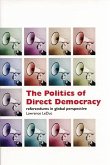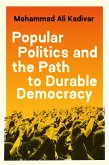At a time when our nation is tumbling down the rabbit hole of plutocracy and autocracy, this unusual book is a much needed cry for sanity and a call for ordinary Americans to rebel against what the author terms "organized lust for money and power by controlling corporations." Read. Rebel. Organize. Mobilize. - Jim Hightower ¿ ¿ ¿ ¿ ¿ ¿ ¿ ¿ The New Nation Party: A Humanitarian Fantasy provides candid discourses regarding conditions that are debilitating this wonderful nation, what is causing them, and hypothetical but achievable corrections for them by a benevolent dictatorship though not immediately or even soon. [This book] is primarily a plea for the betterment of the nation's proceedings that would benefit all of its people instead of only fractions of them.
Hinweis: Dieser Artikel kann nur an eine deutsche Lieferadresse ausgeliefert werden.
Hinweis: Dieser Artikel kann nur an eine deutsche Lieferadresse ausgeliefert werden.








